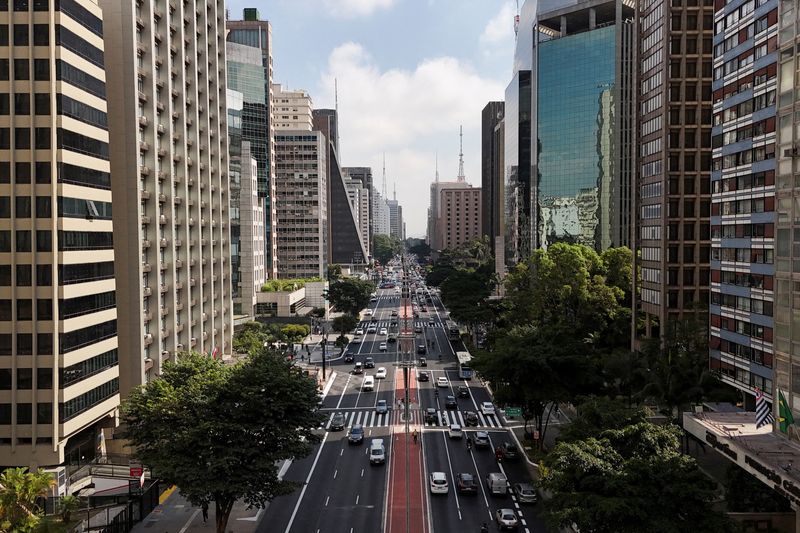By Marcela Ayres and Bernardo Caram
BRASILIA (Reuters) – As Brazil struggles to meet its year-end budget target, the government is getting increasingly creative in how it accounts for spending, tax breaks and new revenues, raising concerns among experts about the credibility of the new fiscal regime.
While most private economists argue that President Luiz Inacio Lula da Silva must cut spending to eliminate the budget deficit as promised, the left-wing economist is reluctant to take his foot off the fiscal accelerator.
Instead, his government has tried to meet budget targets with additional revenues and a series of unconventional proposals: clearing out forgotten bank accounts, enlisting a state lender to provide subsidies to lower the cost of cooking gas, and even creating a new tax break for Olympic medalists. These measures have been criticized for circumventing rules in the tax code.
Asked about the concerns, the Finance Ministry said it was committed to meeting the budget target while strictly following fiscal rules to “ensure the soundness of government accounts”.
While the government’s measures are nowhere near as effective as the accounting tricks that led to the ouster of an ally of Lula’s Workers’ Party in 2016, economists warn they could hurt private investment and push up borrowing costs.
“Once bitten, twice shy. Everyone has seen the extent of fiscal data distortions under previous Workers’ Party governments, and that is why this is affecting market sentiment,” said Marcos Mendes, an economic researcher at the Insper Institute of Education and Research.
“You have a large arsenal of manoeuvres at your disposal to circumvent the difficult task of controlling mandatory expenditures,” he added.
To calm market nerves last year, Lula promised a new fiscal framework that would limit spending growth and create a budget surplus by 2026. This year, he promised to eliminate the primary deficit, excluding debt payments.
With only a few months to go, most private economists still consider this year’s target unachievable. According to a central bank poll, the primary deficit is estimated at 0.6% of GDP, down from 2.4% last year.
Perhaps more worryingly, many argue that the scramble for one-time revenues and non-accounting expenditures to meet the target is distracting from the harder work needed to curb government debt.
“Adding value (to the primary result) just to meet the target will not change our financial position, it will only undermine the credibility of the target,” said former Treasury Secretary Jeferson Bittencourt, an economist at ASA Investments.
Since Lula took office in January 2023, gross government debt has risen by almost 7 percentage points to 78.5% of GDP in July.
A member of the government’s economic policy team, who spoke on condition of anonymity, said most officials recognize that short-term measures to curb spending, such as cracking down on fraudulent beneficiaries of social programs, will not be enough to sustain the new fiscal framework in the coming years.
“Something structural has to happen,” the source said, adding that more drastic attempts to curb social spending would face fierce resistance from Lula’s Workers’ Party.
WORKING WITH THE REF
Instead, the looming year-end target has led to a series of minor debates over the letter of Brazil’s budget law.
When government-affiliated lawmakers sought to appropriate more than 8 billion reais ($1.45 billion) that the Finance Ministry had left in forgotten bank accounts, the central bank issued a memo stating that the funds should not be counted toward the budget target. The government’s coalition in the lower house responded with a provision to include the funds in the budget.
The government has also turned to government lenders to boost social programs, without including the costs in the federal budget.
In August, officials proposed a cooking gas subsidy for poor families, financed with funds from offshore oil exploration routed through public lender Caixa Economica Federal. After criticism, they vowed to revise the idea.
A similar measure, which would channel money from the National Civil Aviation Fund through the state development bank BNDES to provide loans to airlines, is now awaiting the president’s signature.
While some of the government’s budget exemptions have been widely accepted, such as the exclusion of costs for flood relief and forest firefighting, others have prompted surprised reactions.
When social media influencers complained that Brazil taxes the financial rewards of Olympic medalists returning from Paris, Lula signed an executive order exempting the income. However, the government argued that it did not constitute a tax waiver that should be included in the budget.
A technical note from the House of Commons’ Budget and Financial Oversight Consulting Office said the measure violates tax law and Supreme Court precedent because it provides a targeted tax break without offsetting the tax consequences.
Another official on the administration’s economic policy team said the scale of such a maneuver is less important than the precedent of overriding fiscal rules.
“A little accounting trick here and there could get the taste, and that could grow,” warned the official, who asked not to be named to speak freely about internal debates.
($1 = 5.50 real)
(Reporting by Marcela Ayres and Bernardo Caram in Brasilia; Editing by Brad Haynes and Matthew Lewis)







